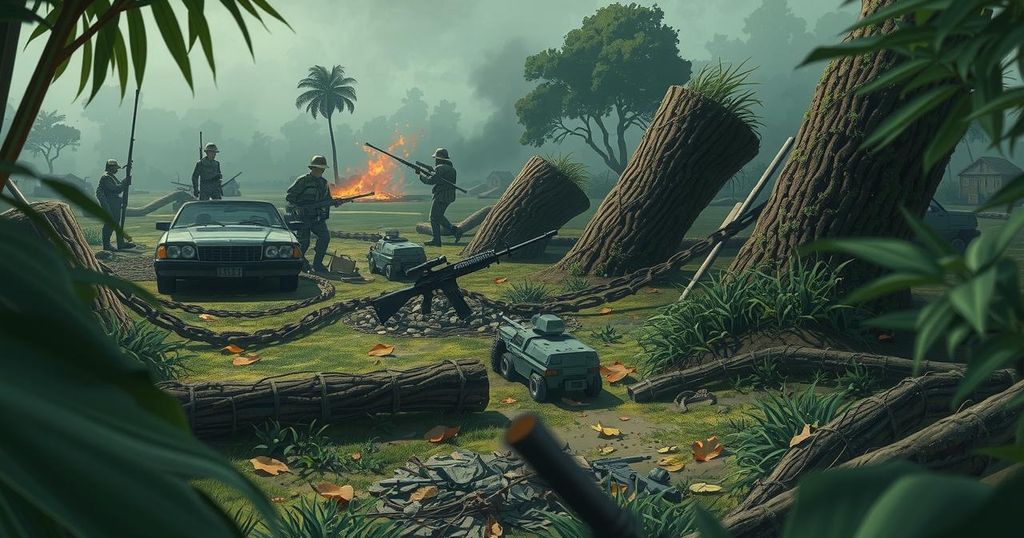Ten Films That Define the Vietnam War on Screen

This article presents ten significant films that address the complexities of the Vietnam War as part of a commemoration for the fall of Saigon. The selections range from Martin Scorsese’s metaphorical short to Spielberg’s portrayal of journalistic integrity, each providing insights into the war’s profound effects on American society and its soldiers.
The Vietnam War significantly influenced American cinema, prompting filmmakers to address its complex legacy. To commemorate the 50th anniversary of the fall of Saigon, we present ten pivotal films that showcase a wide spectrum of experiences, from anti-war narratives to poignant Vietnamese perspectives of resistance, illuminating the lasting impacts of the conflict.
1. The Big Shave (1967): This six-minute short by Martin Scorsese serves as a brutal metaphor for the Vietnam War. A man shaves in front of a mirror and continues despite self-inflicted wounds, ultimately creating a bloody scene, representing the war’s devastation.
2. The Little Girl of Hanoi (1974): Directed by Hải Ninh, this film follows a young girl searching for her family amidst the destruction in Hanoi. It begins as wartime propaganda but conveys deep human emotion, encapsulating the reality of life during the December 1972 bombing raids.
3. Hearts and Minds (1974): This documentary by Peter Davis earned controversy for its stark portrayal of the Vietnam War. Through juxtaposing newsreels and personal testimonies, it critiques U.S. policy, illustrating the divide between American perceptions and Vietnamese realities, reflecting President Johnson’s assertion about winning hearts and minds.
4. The Deer Hunter (1979): Michael Cimino’s film is a cornerstone of Vietnam War cinema, depicting the transformation of a group of friends from innocence to disillusionment as they are drafted. The unforgettable final scene, featuring a group singing “God Bless America,” poignantly showcases their irreversible change.
5. Apocalypse Now (1979): Francis Ford Coppola’s ambitious adaptation of Conrad’s “Heart of Darkness” is set against the backdrop of the Vietnam War. This cinematic masterpiece explores themes of madness and moral ambiguity, heightening the chaos of war into a grand narrative of nightmares.
6. Platoon (1986): A hallmark of Vietnam War films, Oliver Stone’s “Platoon” draws from his own combat experiences. Acclaimed for its raw realism, it remains one of the most visceral portrayals of the conflict, capturing the grittiness and emotional toll of war on soldiers.
7. Full Metal Jacket (1987): Directed by Stanley Kubrick, this film addresses dehumanization through dual narratives: the brutal training of soldiers and the violence during the Tet Offensive. It presents a harrowing examination of the military’s impact on individuals and society.
8. Little Dieter Needs to Fly (1997): Werner Herzog’s documentary tells the remarkable story of pilot Dieter Dengler, who recounts his harrowing experience of capture and escape during the Vietnam War. The film highlights the psychological aftermath faced by those who serve.
9. The Fog of War (2003): This documentary features interviews with former U.S. Secretary of Defense Robert S. McNamara, providing insight into the rationale behind the Vietnam War. It serves as a complex reflection on the destructiveness of ideologies, emphasizing the critical lesson to “empathize with the enemy.”
10. The Post (2017): Steven Spielberg’s film dramatizes the Washington Post’s publication of the Pentagon Papers, focusing on journalist Katharine Graham’s role. It underscores the importance of a free press in wartime and highlights the battle against government secrecy.
For further insights into the Vietnam War and its enduring legacy, please visit https://apnews.com/hub/vietnam-war.
These ten films collectively encapsulate the multifaceted experiences of the Vietnam War, highlighting the emotional and political complexities that arose from the conflict. From harrowing personal narratives to critical examinations of governmental policies, these cinematic works provide profound reflections on the war’s enduring impact and the struggles faced by those involved. They serve as vital reminders of the importance of understanding history and its implications.
Original Source: www.ivpressonline.com






